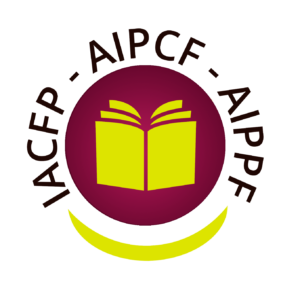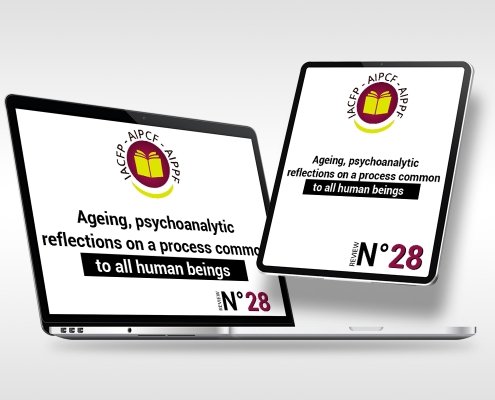ARTICLE
Introduction to the issue: Ageing, psychoanalytic reflections on a process common to all human beings
Irma Morosini, Anne Loncan , Alejandro Klein
This issue is dedicated to the theme of ageing, a process that not only concerns humanity as a whole, but also involves a number of aspects that require a broader and deeper reflection. For the changes that are taking place affect cultures, ways of thinking, needs and other factors imposed by different ideologies. But the greatest challenge presented by psychoanalytic knowledge in relation to the life of old people subject, affected by senescence, is to show that the flame of desire still burns and that it is vital for each subjectivity; questioning the duration of life is only relevant if we address the quality and meaning of life, beyond the question of time. It is necessary to make our contribution to alerting public opinion, to rethink social changes, to study needs and new ways of satisfying them.
Ageing is a subjective process that is part of life itself, and as such involves phases of continuity and/or rupture in terms of the identity of the individual, the functioning of the family group and inter-subjective relations, with reciprocal effects at the social and cultural level. Its study requires a vision that must be broadened to include processes that affect not only the individual, but also the couple, their family and their contemporary institutional partners.
Temporality, the changes of our time, the situations of a couple and/or family mark the life history of each person and all are factors that influence narcissistic and object positions as we age. Without being pathological in itself, this evolutionary phase is crossed by various conflicts and pathologies, which threaten mental health. Many aspects of psychological life are affected, requiring work to reconfigure preexisting links and alliances, bearing in mind that support for these links with others and with oneself is preponderant.
It is therefore important to continue research into the psychoanalysis of relationships and family life habits, in which the role of grandparents plays an increasingly important role. It is necessary to identify the psychic effects of ageing not only in terms of subjectivity, but also in terms of intergenerational links. It should be underlined that transmission in various forms includes material inheritance that is established between ancestors and heirs, involving more generations of the past.
Moreover, the world today is paying more attention to the prevention of decline in old age, and is developing experiments in this field. Does this mean that we are witnessing new forms of identity; that new forms of subjectivity are emerging? Hence the importance of renewing our knowledge of old age, both from the psychoanalysis of the links and ways of life and relationships in families (including grandparents, great-grandparents, grandchildren and great-grandchildren), studying the processes at play in subjectivity, the evolution of intergenerational relationships, addressing the current meaning of the family and the paths taken by the transmission of an inheritance in which ancestors and heirs interact.
The aim of this issue is to approach these questions from a psychoanalytical point of view, without fuss, but without fear of confronting reality, in order to provide original reflections and shed light on this universal and complex process. This is aimed primarily at couple and family therapists when dealing with elderly subjects, or when their patients are facing the senescence of their parents, but it is also intended to interest any caregiver whose practice leads them to encounter older people, either alone or in a family.
To this end, the issue brings together articles that address these aspects in the form of theoretical and/or clinical contributions.
It should be noted that the theme of this issue has not aroused the expected interest among the therapists it concerns, among potential authors who are or will be personally confronted with this process in their partner or family. There is reason to believe that there has been a certain reticence about the concept itself, probably reflecting a revulsion, or even fear, of visible deterioration in older people. However, the psychoanalytic literature is not silent on the subject, and has allowed us to include several published articles in addition to the original ones. This is a way of highlighting intergenerational transmission and bringing it to life. As we were preparing this introduction, Roberto Losso’s death on 22 June 2023, at the age of 95, reminded us that, while finitude is our common fate, it also marks the end of a process – ageing – that affects each of us and our families in very different ways. As the author, with his wife Anne, of one of the texts reprinted in this issue, he demonstrated an intellectual vivacity that was preserved in old age. We thank him posthumously
To pay tribute to him, this issue 28 begins with «Abuelos y nietos hoy: la “abuelidad”», in which Roberto Losso and Ana Packciarz Losso take up the concept of grandparenthood to refer to the relationship and function of grandparents towards their grandchildren and the psychological effects of the ties that bind them together.
According to the authors, this concept is linked to the function of passing on knowledge from the past to the grandchildren’s generation. They identify various situations in family life that prevent good intergenerational communication between grandparents, parents and grandchildren, for example, when grandchildren are seen by the other generations as a trophy to be disputed, as an object of jealousy, or when the grandparents’ excessive narcissism limits their closeness to their grandchildren. On the other hand, other circumstances are considered favourable, when there is good contact between grandparents and grandchildren. Both generations are enriched by this: grandparents are like “narrators” of the family saga and bearers of the trophic myths of origins. Faced with the challenges of today’s society, grandchildren can provide the vital forces that oppose the destructive forces at work. Finally, the authors point out that the tri-generational approach in the clinic can help to address many Intergenerational conflicts.
Daniela Lucarelli then presents an original text, «The ageing couple: the need for changing the links and the unconscious alliances in a time of longer life expectancy»., focusing on how links, relationships, the couple, become more complex with age, which in turn indicates the need to modify them so that they do not impede necessary transformation processes. In this way, it is indicated that as time goes by, it becomes necessary to work on the very process of ageing, which means that the members of a couple must be able to renegotiate a new way of being with each other and recognise a new image of themselves and of the other. A couple’s success in transforming these bonds can enable the establishment of a dynamic process through which to restructure their functioning and integrate change and permanence. Based on these premises, the author provides clinical material from couple therapy with older couples.
Otto Kernberg’s article is a new publication of «Relations amoureuses dans les années tardives», in which the author addresses the sensitive topic of love between older adults, pointing out how it is possible through this experience to recreate situations of deep intimacy by sharing the feeling of insecurity linked to the risks of age (illness, dependence, limitation of remaining time). Kernberg observes that this achievement of intimacy allows for a freer sexuality, capable of integrating perverse polymorphous infantile elements. In this way, the evolution of the oedipal constellation of the whole of life is posited, with the emotional possibilities that make it capable of leading the woman towards sexual maturity and the man towards a deeper relationship, demonstrating that passionate love is also possible at this stage of life.
In «“L’ancêtre insuffisamment bon”: le maillon générationnel défaillant», Christiane Joubert analyses the crisis of ageing and its family resonances, particularly in terms of temporality and the nature of the bond between old people couple. She also examines the psychopathology of the elderly, particularly senile dementia. It highlights the resulting family dysfunctions: damage to bonds within the family, in particular fraternal bonds, the emergence of transgenerational suffering, with disruption of the bond of filiation, leading to genealogical disruption and its effects on family memory. The article is illustrated by a clinical situation which shows how the psychoanalytic treatment of families in geronto-psychiatric institutions aims, on the one hand, to favour access to symbolisation and, on the other hand, to allow the family to work on the separation within the family and, consequently, to anticipate the work of mourning.
Alejandro Klein’s article «Una aproximación desde el psicoanálisis para comprender las reconfiguraciones subjetivas actuales en los adultos mayores» proposes to offer psychoanalytical keys to a better understanding of identity processes and subjective changes in today’s elderly. The hypothesis is that they use a device that psychoanalysis has traditionally described as referring to adolescents: generational confrontation. He suggests that this confrontation is redoubled and signified anew, which would be a decisive element in understanding how older adults’ new configurations of subjectivity are set in motion. For the author, the concept of this “transgenerational confrontation” marks a decisive break with traditional models of old age, as it highlights the search for new opportunities for emancipation and life.
Osvaldo Bodni’s article: «Vejez. Transmisión. Legados», expresses concerns about the diminishing consideration of older people, both in the world of work and in family discourse and decision-making. In the world of work, little account is taken of the experience of older people, due to the acceleration of technology and the rapid obsolescence of knowledge. Similarly, there is a devaluing of their former role as storytellers. This leads to feelings of uselessness, loneliness and even depressive thoughts and feelings. In these conditions, it becomes difficult to pass on cultural legacies, while an oedipal framework reappears, laden with a mortifying weight. A clinical vignette describes a family situation without hospitalisation, in which the restorative role of a well-adapted and supervised caregiver is highlighted.
Giacomo Di Marco’s «¿Vivir el duelo o estar de luto?» reflects on death as an inevitable and impenetrable phenomenon around which humanity has for centuries woven a fragile web of mythologies and rituals, all of them magical devices and techniques designed to mask the inevitability of the event. The author points out that various ethnic groups with different traditions hold the idea that the dead are born, live and are reborn again and again in the minds of the survivors. Depending on the culture, the dead are imagined as identical and preserved or, on the contrary, as different and transfigured; in all cases, they survive. At the same time, the survival of the living is dialectically linked to death: it depends entirely on the acceptance (or rejection) of the disappearance of the deceased, a subject that arouses anguish and mystery.
The article by Federico Suárez: «Una nueva vida en común para seguir siendo. Algunas líneas para reflexionar sobre el desarrollo de las viviendas de mayores» relates the author’s experience as an observer in discussion groups organised within the framework of a research project aimed at finding out the current situation and reflecting on the possible development of the existing ageing housing (VVMM) in the Autonomous Community of Castilla-La Mancha, Spain. Based on this experience, the article offers some reflections on the particularities of this type of housing and its function as an indicator of the quality of life of the elderly.
This issue closes with a reading note by Irma Morosini on Osvaldo Bodni’s book: La delegación del poder en el envejecimiento humano. Teoría del legado y de la investidura del sucesor (Buenos Aires, Editorial Psicolibro ediciones, 2013). This work brings together and highlights a relevant topic, which has not yet received the attention it deserves in the psychoanalytic field, around the problematic of the metapsychology of desire, the meaning of inheritance, succession and the designation of the eventual successor. It also deals with the forms of cultural transmission, links and affections, in order to preserve memory and constitute history.

